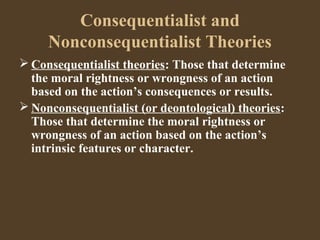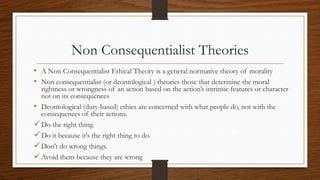Definition of Non Consequentialism in Ethics
Central to Kants morality theory is his claim that. He believed that moral rules can in principle be known as a result of reason alone and are not based on observation as are for example scientific.
Crane and Matten Justice can be defined as the simultaneously fair treatment of individuals in a given.

. Ethics or moral philosophy is a branch of philosophy that involves systematizing defending and recommending concepts of right and wrong behavior. So from the perspective of a consequentialist an ethically right act is the one that will inherit good outcome or consequence. The right act is the act which maximises well-being.
Nonconsequentialism is a normative ethical theory which denies that the rightness or wrongness of our conduct is determined solely by the goodness or badness of the consequences of our acts or the rules to which those acts conform. The field of ethics along with aesthetics concerns matters of value. It does not deny that consequences can be a factor in determining the rightness of an act.
Learn faster with spaced repetition. Consequentialism is based on two principles. In a non-consequentialist moral theory 1 there is a permission not to maximize overall best consequences this is sometimes referred to as an option and 2 there are constraints on promoting overall best consequences for example we must not kill one innocent non-threatening person for.
Second a non-consequentialist believe that the value of an action is not the. The more good consequences an act produces the better or more right that act. Say for example killing one person to save the lives of 9 other people is justified by the greater good.
The most familiar example would be utilitarianism--that action is best that produces the greatest good for the greatest number Jeremy Bentham. Consequentialism is a type of normative ethical theory which states that the moral quality of an action is completely determined by its consequences and nothing else. Kants Ethics- non-consequentialist theory German philosopher Immanuel Kant 1724-1804 sought moral principles that define actions as inherently right or wrong irrespective of any consequences.
Nonconsequentialism is a type of normative ethical theory that denies that the rightness or wrongness of our conduct is determined solely by the goodn. But if telling a lie would help save a persons life consequentialism says its the right thing to do. Deontological Ethics refers to a class of ethics in which the principle of obligation is the basis of moral decision making.
The Greek terms deon and logos means duty and reasoning. Kants theory is an important example of a purely non-consequentialist approach to ethics. Non-consequentialism has two important features.
Hence deontology is the reasoning of dutyIn contrast to Consequentialism it does not consider the context or consequence of the action but the way one chooses to think when he makes his. Consequentialism is an ethical theory that judges whether or not something is right by what its consequences are. Nonconsequentialism denies the truth of both act and rule consequentialism which are understood as holding that the right act or system of rules is the one that maximizes the balance of good.
For example welfare consequentialism or welfarism maintains that all that matters or is good is welfare or well-being. The definition of consequentialism therefore is the position within normative ethics determining if an action is right or wrong depending on whether it brings about a good or bad consequences. Study Ethics of duty non-consequentialist flashcards from Craig Irvings Lockerbie Academy class online or in Brainscapes iPhone or Android app.
In this way consequentialism ethics provide criteria for the moral evaluation of actions while also recommending rules or decision-making criteria for future actions. Consequential Ethical theory It is a part of normative ethical theories and it means that the consequence of ones behavior is an ultimate mean for anyone to judge the rightness or wrongness of that behavior. A non-consequentialist theory of value judges the rightness or wrongness.
Secondly i will brief what is Kants non-consequentialist theory. On the other hand some philosophies do not agree with the consequentialist theory so they developed a theory called non-consequentialist ethical theory as known as duty-based theory and deontologists. Virtue Ethics is included under Non-Consequentialism simply because the focus of virtue ethics is on the creation or expression of character traits and not on production of the greatest net aggregate of consequences.
Duties can obviously be stated. First of all consequential theory means that doing a morally right action is some type of action that will lead to the maximum balance of a good over something bad or evil. Two examples of consequentialism are utilitarianism and hedonism.
There are many different forms of consequentialism depending on how one values outcomes. Deontologists is more concern on duty rule obligation not on the result of action but on its principle. Definition of Ethics of justice.
Whether an act is right or wrong depends only on the results of that act. Kant held that only when we act from duty does our action have moral worth Shaw Barry Sansbury 2009 P92. Consequentialism is a broad school of ethical theory.
These fields comprise the branch of philosophy called axiology. It is impossible to conceive anything at all in the world. For instance most people would agree that lying is wrong.
In this essay Kants ethical non-consequentialist theory will be briefly investigated and a comparison drawn between the two different theories in order to establish merit in employment thereof in practice. Ethics seeks to resolve questions of human morality by defining concepts such as good and evil right. The other types of Non-Consequentialist theories share the feature of being clearly rule oriented.
There different ethical theories when it comes to ethics in healthcare. Three of those ethical theories would be consequentialism non-consequentialism and virtue ethics. Answer 1 of 3.
Empirics think humans knowledge of the world comes from human. First a consequentialist believes the value of actions is the results like the greater good. A consequentialist theory of value judges the rightness or wrongness of an action based on the consequences that action has.

Chapter 2 The Normative Theories Of Ethnics

Ethics Act Non Consequentialist Travis Youtube

Consequentialism Vs Non Consequentialism A Explain The Otosection


No comments for "Definition of Non Consequentialism in Ethics"
Post a Comment